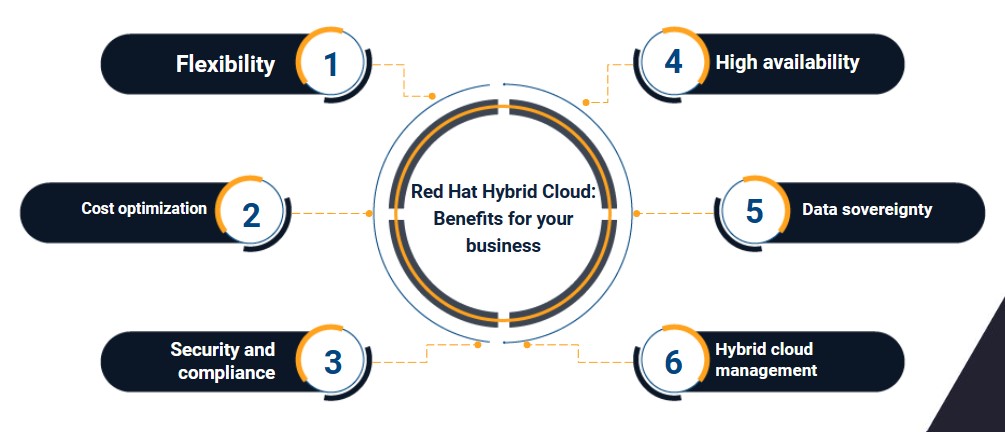
Cloud computing has established itself as one of the most popular technical solutions for businesses globally, providing a safe and functional platform for storing and managing data and software. Red Hat is the most advantageous cloud computing platform.
Red Hat is a corporation that offers a wide selection of Linux products to organizations of all sizes, as well as solutions to help with cloud administration and container management. As a result, it is now used in hundreds of internal software applications around the world that rely on hybrid cloud functionality.
What is a hybrid cloud infrastructure?
A hybrid cloud infrastructure is a computer environment that combines the usage of public and private cloud services, allowing businesses to profit from both. It combines on-premises infrastructure, private clouds, and public clouds into a unified architecture.
Organizations can maintain sensitive or important data and apps in their private cloud or on-premises infrastructure while employing the scalability and cost-effectiveness of public cloud resources for non-sensitive or less critical workloads in a hybrid cloud arrangement. This hybrid strategy provides flexibility by allowing businesses to assign resources dynamically based on their specific needs, workload demands, and security requirements.
What are the benefits of a hybrid cloud infrastructure like Red Hat for industries
The key features and benefits of a hybrid cloud infrastructure like Red Hat's are countless, making it an ideal solution for any type of business and industry. If we must highlight some benefits or features, these include:
Flexibility
Organizations can scale their infrastructure up or down by leveraging the elastic resources of the public cloud while maintaining control over sensitive data and critical applications.
Cost optimization
By using public cloud resources for non-sensitive workloads, organizations can optimize costs and avoid the need to overprovision their private infrastructure. Red Hat offers a hybrid cloud infrastructure that easily accommodates any customer or business budget.
Security and compliance
Sensitive data and critical applications can be kept in the private cloud or on-premises, providing greater security and compliance.

High availability
Hybrid cloud infrastructure enables redundancy and failover capabilities, allowing organizations to ensure high availability and minimize downtime.
Data sovereignty
Certain regulations or data governance requirements may require keeping data within specific geographic boundaries. Hybrid clouds allow organizations to address these concerns by using the right cloud deployment model.
Hybrid cloud management
Powerful management tools and platforms are available to help organizations monitor, orchestrate, and manage resources in public and private cloud environments.
In general, a hybrid cloud infrastructure such as that provided by Red Hat provides a balance of control, security, and flexibility, allowing organizations to take advantage of the best of both public and private cloud environments.
Rootstack and Red Hat have formed a strategic partnership
Rootstack has built agreements with numerous technology businesses over the years in order to provide the finest service to its international clientele, and Red Hat is one of them. From innovative cloud projects to infrastructure support.
In the case of banking institutions, for example, employing an operating system like Red Hat's provides numerous advantages. Assume you need to create an online banking system. It is a platform that must be extremely dependable and secure, with no downtime.
In this particular case, you need an operating system that has Enterprise support, as well as official update packages that are constantly reviewed by a qualified team, which guarantees the quality and security of what you are installing. All that and more is Red Hat. Because they offer support for at least 10 years for the version you install, Red Hat is a good choice for large projects.
We recommend you on video


